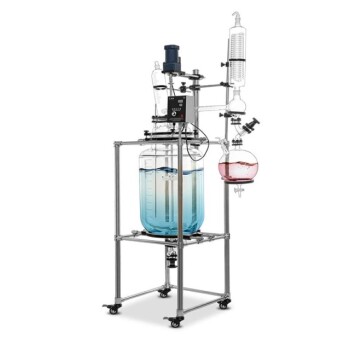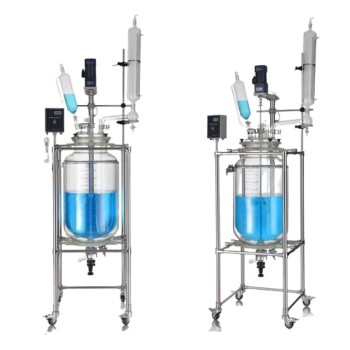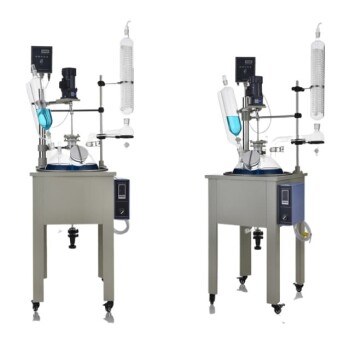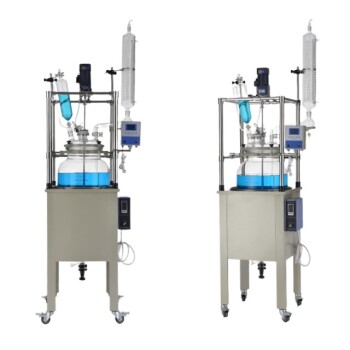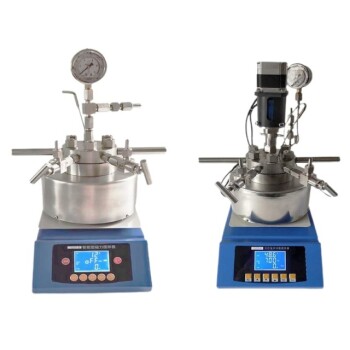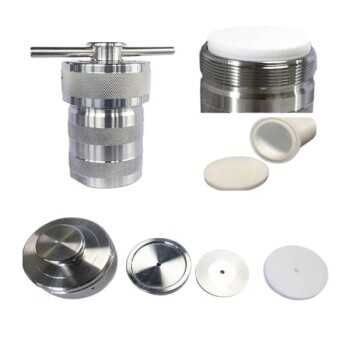A jacketed agitated reactor is a specialized vessel used in chemical, pharmaceutical, and industrial processes to control and maintain precise reaction conditions. It consists of a reactor vessel surrounded by a jacket that circulates a heating or cooling medium to regulate the internal temperature. The reactor is equipped with an agitator for mixing contents and baffles to enhance fluid movement. This design ensures efficient heat transfer, consistent reaction conditions, and improved product quality. Jacketed agitated reactors are widely used in industries such as pharmaceuticals, chemical processing, and food production for applications like distillation, crystallization, and extraction.
Key Points Explained:

-
Structure and Components:
- Jacketed Vessel: The reactor is surrounded by a jacket that circulates a heating or cooling medium (e.g., water or oil) to control the internal temperature.
- Agitator: A variable-speed stirrer ensures thorough mixing of the contents, which is crucial for uniform reactions.
- Baffles: These components prevent vortex formation and enhance fluid movement within the reactor.
- Thermocouples: Placed at strategic points, they monitor and maintain precise temperature control.
-
Functionality:
- Temperature Control: The jacket allows precise regulation of the reaction temperature, which is critical for exothermic reactions or processes requiring consistent heat.
- Insulation: The jacket also acts as insulation, preventing heat loss or gain and maintaining stable reaction conditions.
- Volume Adjustment: Some reactors feature a modifiable overflow to adjust the internal volume, accommodating different batch sizes.
-
Applications:
- Pharmaceuticals: Used for API manufacture, crystallization, and extraction.
- Chemical Processing: Employed in distillation, homogenization, and post-processing.
- Food and Dyes: Essential for refining and extraction processes.
- Engine Oil Production: Helps control reaction temperatures and improve product quality.
-
Advantages:
- Enhanced Product Quality: Precise temperature control leads to consistent and high-quality outputs.
- Efficiency: Faster reaction times and improved heat transfer.
- Versatility: Suitable for a wide range of temperatures and pressures.
- Safety: Leak-free operation and maximum chemical resistance.
- Upgradability: Can be upgraded to automated systems for enhanced control and reliability.
-
Design Features:
- Composite Construction: Combines metal and glass for strength, corrosion resistance, and a non-contaminating surface.
- Operational Ports: Allow for adding content, measuring temperature, and recovering distilled materials.
- Space-Saving: Compact design suitable for various industrial settings.
-
Industry Relevance:
- Pharmaceuticals: Ensures precise control over reactions, critical for drug manufacturing.
- Chemical Industry: Facilitates complex processes like distillation and crystallization.
- Food and Dyes: Supports refinement and extraction processes with high efficiency.
By combining these features, jacketed agitated reactors provide a reliable and efficient solution for industries requiring precise control over chemical reactions and processes. Their versatility and advanced design make them indispensable in modern industrial applications.
Summary Table:
| Aspect | Details |
|---|---|
| Structure | Jacketed vessel, agitator, baffles, thermocouples |
| Functionality | Temperature control, insulation, volume adjustment |
| Applications | Pharmaceuticals, chemical processing, food production, engine oil |
| Advantages | Enhanced product quality, efficiency, versatility, safety, upgradability |
| Design Features | Composite construction, operational ports, space-saving design |
| Industry Relevance | Pharmaceuticals, chemical industry, food and dyes |
Optimize your industrial processes with a jacketed agitated reactor—contact us today to learn more!

